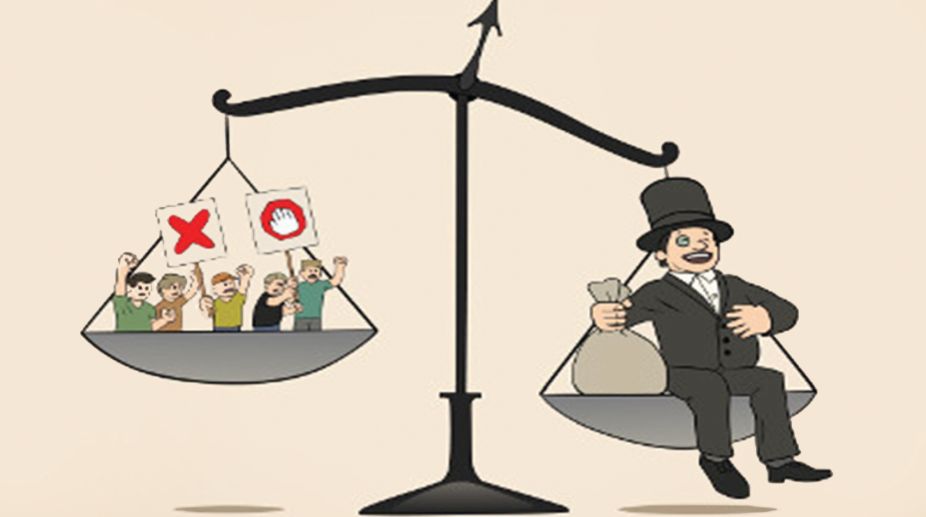The ‘Massachusetts Institute of Technology Review’ has an interesting article this March titled ‘If you’re so smart, why aren’t you rich?
Turns out it’s just chance’, featuring Alessandro Pluchino’s computer simulation to explore how people become wealthy.
Professor Pluchino and his colleagues at the Italy’s University of Catania tackled questions such as: What factors influence how individuals become wealthy? Could chance play a bigger role than expected? And how can these factors of wealth creation be used to make the world a better and fairer place?
Their computer model studied the role of chance in this process. And they concluded that a factor of “pure luck” contributes to wealth distribution, besides talent and hard work.
Not really, Signor Pluchino. No chance for chance to play a role in wealth, or anything in life. Mother Nature does not gamble, and the Law of Cause and Effect ensures there is nothing called ‘coincidence’.
Often, when we cannot find the cause behind an outcome or effect, our limited understanding attributes fortunes or misfortunes to ‘luck’ or divine intervention. But we get exactly what we deserve – nothing more, nothing less. A random roll of fate’s dice has no play in life’s journeys.
Likewise, honest wealth too comes not merely from talent and very hard, efficient work, but also from the Law of Cause and Effect: those who give get more in return, across lifetimes. This is no empty philosophy but practicality of nature.
Nature’s accurate Accounts Department does not stop working at death, but continues delivering bitter or sweet fruits based on our actions.
The settling of accounts continues beyond the final moment of this existence, in life after life, until all accounts are settled. No escape from settling all accounts.
Whether or not you accept this crucial truth of life and death, the indisputable reality is that a particular fruit can emerge only from a particular seed. A neem seed cannot produce apples. Likewise, what we now experience is happy or unhappy fruit of past wholesome or unwholesome actions.
Outdated economic theories too ignore the Law of Cause and Effect. Wealth with delusion offers no peace and happiness, and explains why many of the materially-wealthy suffer tension-stricken lives.
For economics to become ‘human-omics’ needs practical understanding of the Law of Cause and Effect. How much we get depends on how much we give.
For accuracy of socio-economic development, wiser economists have to measure not just GDP, but also ‘GDS’ – Greater Developmental Sharing. A percentage of wealth has to be voluntarily invested in social development.
Governmental taxation and the self-gratification of excessive consumerism can never solve old or new problems.
Voluntary sharing of wealth, and not merely its creation and spending, needs to be part of evolutionary economics. A core, beneficial purpose of wealth is to give.
“In the ancient tradition of India, dana (donation) has always had special importance,” wrote former multi-millionaire industrialist and the late Principal Teacher of Vipassana Sayagyi U Goenka (1924 – 2013). “…. the wealth of the community tends to accumulate with the rulers and wealthy men. If this wealth remains with them, it begins to rot and makes the whole community unhealthy. If wealth is re-distributed, its purity is maintained. This wise policy of (voluntary) equitable distribution of wealth preserved the equilibrium of social prosperity and prevented it from becoming an unbalanced destructive force.”
He put this principle of voluntary giving to test by emphasising that residential Vipassana courses (ancient India’s universal practice to earn inner wealth of real happiness) will only be taught completely free of cost.
No fees for even boarding and lodging, to maintain the timeless non-commercial purity of the teaching. Teachers of Vipassana in this tradition do not receive any fee for their service in residential courses from 10-days to 60-days.
Along with volunteers called ‘Dhamma workers’, they take time off from their various professions to donate their service. This purity of giving is working fine, in nearly 200 Vipassana centres across India and worldwide, in serving humanity in what I experience as the most beneficial force of inner change.
Vipassana course participants donate voluntarily according to volition and means. Donations are accepted only from those who have completed a Vipassana course. But nobody goes around asking if you wish to donate.
You may give or not, as you wish. But ten rupees given with the pure volition “as I benefited, may others also benefit” becomes more valuable than millions given with ego, or a sense of compulsion.
This quality of volition matters more than the quantity of giving. An elderly lady selling vegetables donating a few coins for a most beneficial cause has greater value than millions given for publicity; a homeless, hungry person sharing a bun with a street dog becomes a greater act of giving than a six-figure cheque given with a sense of compulsion.
Whatever is given with compassion ensures happiness for the giver. He or she gains a sense of freedom, besides long-term material rewards. Hoarding wealth or possessions actually cause insecurity, fear and misery. A quality life needs a quality state of mind, of being free.
Which is why the wiser wealthy are philanthropists donating their wealth for good of society. They understand the practical necessity of giving – whether it be a Tata, Birla, Rockefeller or Gates.
Nature gives more to those who give more, because nature needs conduits for wealth.
But such sharing cannot come from failed, disastrous ideologies of compulsion, but with free individuals making choices of practical wisdom.
The more we give with compassion, more we gain. Wealth or lack of it has nothing to do with ‘luck’ because the laws of nature do not operate randomly on ‘chance’.
The writer is a senior, Mumbai-based journalist.












